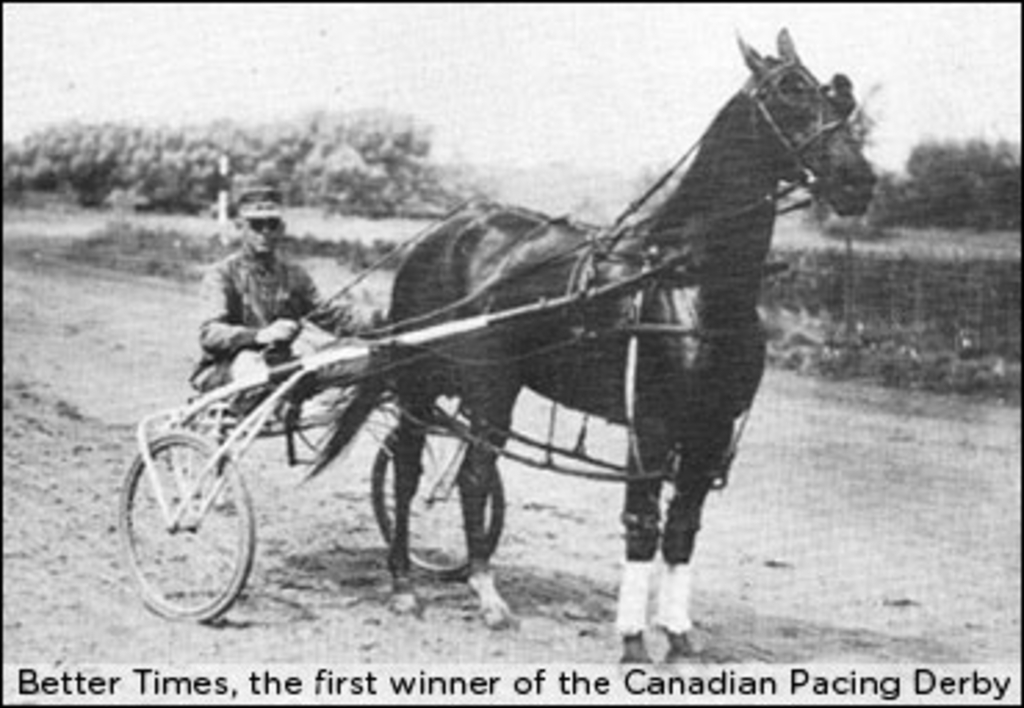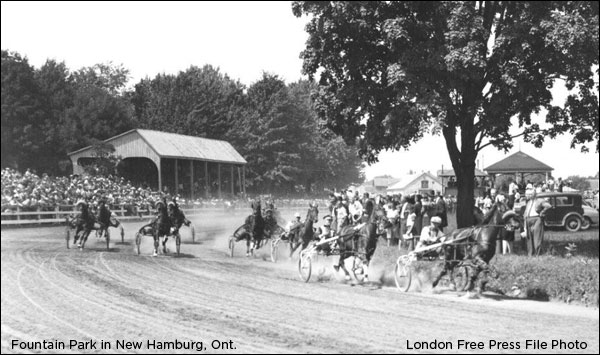SC Rewind: The Derby And Its Beginnings

Writer Robert Smith takes a long look back to 1936, the year of the inaugural Canadian Pacing Derby
.
Post time for this year's Canadian Pacing Derby is fast approaching. While it is not Canada's richest race in terms of purse money, it is hands down "the granddaddy of them all" based on history and tradition. It is without parallel in my mind. In the months and years ahead I hope to retell some of the great stories and show the pictures from those glory days. This memorable era of Canadian harness racing is truly a treasure.
The first Derby took place on August 12, 1936 in a place far away from the great city lights we now associate with world class racing. Its birthplace and eventual home for 22 years was the quaint little Waterloo County town of New Hamburg, Ont. Located between Kitchener and Stratford, the actual scene was Fountain Park, for many years the showplace of Canadian harness racing.

The concept and the original Derby formation was the idea and dream of a number of New Hamburg residents, most if not all who were not horse owners but rather horse lovers. Many months of planning and countless hours of discussions, often held around a pot bellied stove preceded the big day. The first president of the local turf club was Dr. T.C. Kirkpatrick, a man who practiced medicine in the town for some 42 years between 1932 and 1974 . Earl "Katzy" Katzmeier, a life insurance salesman, served as the club's secretary and was the race's driving force throughout its lifetime. Scores of others too numerous to mention filled various roles, most often on their own time. Many years after this era I had the pleasure of several discussions with the good Doctor, who at that time was hale and hearty and in his mid 80's. Perhaps the recipient of some of his own good medical advice.
The first Derby attracted eight entrants and the practice in those days was that each race went three heats to declare a winner. The purse up for grabs was an incredible $1,275! The weather was cooperative and a crowd reported at 7,000 was on hand, a number that eventually grew to over 20,000 at its peak after WWII. On the undercard was three other races, all contesting three heats so race goers were treated to 12 full races that warm August day long ago.
In the first heat, a blistering time of 2:07 was hung up by one of the circuit's best performers, Peter Chilcoot from the barn of The Hon. Earl Rowe of Newton Robinson Ont. Second was Trixie G. for Bill Herbert with Lastic Patch taking the show position.
While I'm sure all those who finished "back" of the leader felt a certain disappointment, one horse put in a rather dismal performance. Finishing eighth and last was a horse named Better Times. Oh how poetic it could have been if the racing gods had allowed him to be the winner, if only for the benefit of historians and writers years down the road. After all, one of the aims of the organizers was to establish a new outlook on life following the dreadful years of the Great Depression years, just barely passed. But better times and Better Times were in the future...
When the horses faced starter Jack Climie in the second heat, the London owned Better Times returned to his earlier season form and paced to victory lane in 2:09 1/2. A short time later to round out the afternoon the gelded son of Burton Patch again fronted the field in 2:09 1/4. He actually finished second but the judges ruled interference against Lastic Patch causing a reversal of finish. Based on his standing of 8-1-1 Better Times became the first winner of what was eventually to become Canada's premier race. In the course of a single afternoon, Canada's most enduring race was born.
Better Times (click here for larger version of image posted on homepage) was owned by Londoner J.S. Koch. His trainer and driver was a then 34-year-old up and coming driver from Drumbo, Ont. named Floyd Milton. While the race's winner was later sold and moved eastward, the same was not true of his driver. Floyd Milton went on to a very accomplished career in the sulky and later as one of the first horsemen to graduate to become a racing official. His daughter Ann Hardy and husband Andy, and his granddaughter Amy Hardy are still involved in the sport. Floyd Milton passed away in 1983 at the age of 81.
All of those who trained and drove Derby winners at New Hamburg have now passed but their memories remain. The contributions of these many hard working and dedicated people helped to lay the groundwork for the sport we still enjoy today, and continue to make the Derby Canada's "special" race.


Thank you for giving us some
Thank you for giving us some great memories of the Canadian Pacing Derby from years ago. My father, Marshall Moore, raced in 1949 Derby with Dixie Lee Hy and would love telling the story of starting in the 3rd tier!! I love seeing your "Rewind" stories as it brings back many stories that my father told of his racing career.